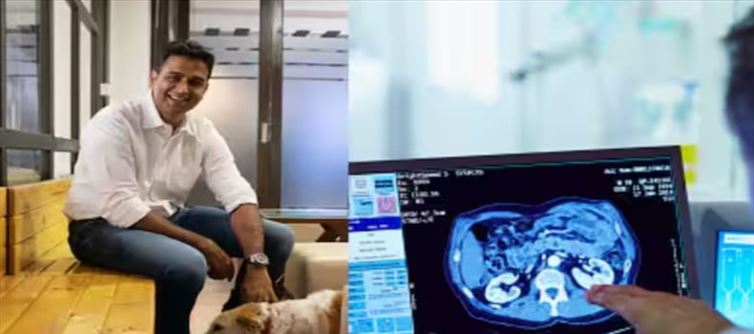
Zerodha Co-Founder nithin Kamath Recovers From Stroke: Know Tips For Stroke Recovery And Stress Management
Strokes are of two types: Ischemic Stroke (caused by blockage of an artery) and Hemorrhagic stroke (caused by bleeding).
Zerodha co-founder nithin Kamath shared on social media on monday that he is on the path to recovery following a 'mild stroke' he experienced six weeks ago. Kamath speculates that factors such as his father's passing, inadequate sleep, fatigue, dehydration, and excessive work may have contributed to the incident. Doctors have recommended that he should ease up on his workload and take a step back. Now, strokes are of two types: Ischemic Stroke and Hemorrhagic stroke.

Ischemic strokes: These are strokes caused by blockage of an artery (or, in rare instances, a vein). About 87% of all strokes are ischemic.
Hemorrhagic stroke: These are strokes caused by bleeding. About 13% of all strokes are hemorrhagic.
How Do Strokes Occur?
A stroke is a medical emergency condition that occurs when the supply of blood to a part of the brain is disturbed, which leads to the deprivation of oxygen and nutrients to brain tissues. This interruption can result from either a blockage in the blood vessel, which can cause ischemic stroke, or the bursting of a blood vessel, leading to a hemorrhagic stroke. Recognizing the warning signs and seeking prompt medical attention is crucial, as untreated strokes can result in the loss of 19 lacs neurons per minute.
Dr. Aradhana Chauhan, who is a Neurologist at Sahyadri Specialty Hospital, Deccan Gymkhana, pune mentioned how each type of stroke occurs:
Ischemic Stroke
Ischemic stroke is a commoner sub-type. These happen when a blood artery feeding the brain is clogged, which stops the blood from flowing normally. The brain cells become deprived of oxygen and nutrients due to this obstruction, which may be brought on by a blood clot or other debris. Preventing more brain damage requires prompt detection and treatment of ischemic strokes.
Hemorrhagic Stroke/Bleeding
A blood vessel in the brain bursts or spills, resulting in hemorrhagic stroke, another kind of stroke. Significant harm to the surrounding brain tissues may result from this bleeding's elevated internal pressure inside the skull. Handling hemorrhagic strokes quickly is essential because lowering blood pressure and stopping the bleeding might lessen the amount of brain damage.
Transient Ischemic Attack (TIA)
In some cases, individuals may experience a transient ischemic attack (TIA), where the circulation to the brain is temporarily interrupted. Although TIA symptoms are temporary, they serve as warning indicators and should not be ignored. Early recognition and intervention can help prevent a full-blown stroke.
Measures To Take For Stroke Prevention:
Dr. Mohd Shuaib, Physician at Prayag Hospitals Group suggested the following ways to prevent the occurrence of strokes:
Keep your blood pressure in the normal range
If you smoke, quit
Keep your blood sugar (glucose) in the normal range
If you have heart disease, get treatment
Keep your cholesterol levels in the normal range
Stay at a healthy weight
Get active
Eat healthy
Tips To Manage Stress To Prevent The Occurrence Of Stroke
Managing stress is important for preventing strokes because when stress lasts a long time, it can make heart problems more likely.
Dr Austin Fernandes, who is a Psychiatrist, at Dr. L H Hiranandini Hospital, Powai, mumbai said, "One big way to manage stress is by exercising regularly, which helps your body release natural stress-relieving chemicals. Eating a healthy diet with lots of fruits, veggies, and healthy proteins, and avoiding too much caffeine and junk food, also helps keep stress levels down. Doing things like deep breathing, meditation, or just relaxing can calm your mind and body."
Apart from this, there are also other ways to manage stress such as:
Managing your time well, having friends and family to talk to, and getting enough sleep are also important for lowering stress.
It's also crucial to cut back on things like alcohol and smoking because they can make stress worse and increase the chances of having heart problems.
Simple practices like staying focused on the present moment and not worrying too much can also help manage stress.
Lifestyle Changes That Help To Reduce Stress
To mitigate the risk of strokes embracing lifestyle adjustments to manage stress is imperative.
Dr. Narayanaswamy, Founder of Athreya Hospital listed the following lifestyle changes that will help to reduce stress.
Prioritizing healthy habits such as regular physical activity, keeping oneself joyful, maintaining a balanced diet, and ensuring sufficient sleep is paramount.
Aim for at least 30 minutes of moderate-intensity exercise most days, focusing on activities that bring joy.
Embrace a diet rich in fruits, vegetables, whole grains, and lean proteins, while minimizing processed foods, excessive sugars, and unhealthy fats.
Adequate sleep, totaling 7-8 hours per night, is essential for both physical and emotional well-being, fostering better stress management and resilience. Furthermore, mindfulness techniques like yoga, meditation, deep breathing exercises, and communing with nature offer potent tools to soothe the mind and alleviate stress hormones.
Engaging in activities that bring pleasure, fostering connections with loved ones, and setting realistic goals are pivotal strategies to prevent feeling overwhelmed amidst life's demands.Strong social connections can provide emotional support and reduce feelings of isolation. One should cultivate self-awareness regarding stress levels and triggers.




 click and follow Indiaherald WhatsApp channel
click and follow Indiaherald WhatsApp channel